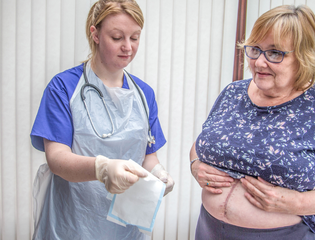Ovarian cancer and fertility

Ovarian cancer treatment can mean you won’t be able to become pregnant naturally but you may still have other options.
Having ovarian cancer and the resulting treatment will probably affect your fertility. You may have been diagnosed at a time when you were planning to get pregnant. You may have been thinking of a future which included children and that now looks very different. It's normal to feel overwhelmed in these circumstances.
Your treatment and fertility
Ovarian cancer treatment can mean you won’t be able to become pregnant naturally but you may still have other options.
It is very important for you to talk about your fertility needs before your treatment starts. Your clinical team may be able to plan treatment that could preserve your fertility and give you some choices for the future.
You may not get the chance to do this if treatment has to start immediately, or you have been diagnosed through emergency surgery. You can still talk about this after treatment.
“I went on to have a baby with IVF after my tumour was removed and chemo. I would like women to know that in some cases it may still be able to have their own children. Talk to your medical team about different options available.”
If the cancer is caught early, with only one ovary involved, or if you have a germ cell tumour of the ovary, it might be possible to keep your womb and the remaining ovary and so still be fertile.
It may be necessary for you to have chemotherapy, which may damage your remaining ovary or increase the risk of an earlier menopause.
It may be helpful to seek fertility counselling and your medical team should be able to help you find this.
A discussion about your fertility and treatment options should include:
- A discussion about adjusting treatment to preserve fertility
- A realistic assessment of your chances of getting pregnant after treatment
- Options for fertility treatment, including the costs if you choose to fund this privately
- If you are planning to use your partner's sperm, he will need to have fertility testing too
Fertility options
In Vitro Fertilisation (IVF)
IVF is the process in which eggs are fertilised by sperm (from your partner or a donor) in a laboratory and then placed into your womb. Depending on your diagnosis it may have been possible to harvest your eggs before your treatment starts, but it may not always be possible to delay treatment to do so. In this case you can still use a donor egg.
In some areas, the NHS will cover the cost for some IVF. Speak to your CNS or oncologist who can support you to get a referral from your GP. If you are not eligible for NHS funding or you decide to pay for IVF you can contact a private clinic.
The Human Fertilisation and Embryology Authority (HFEA) regulates and licenses fertility clinics. You can find out more about IVF techniques, how long treatment may take, how many babies have been born to their patients, how to find a clinic and the costs on their website hfea.gov.uk . Most fertility centres advise that you wait for two years after treatment ends before trying to have a baby.
Other options
If you do not want or are unable to have IVF due to the extent of your surgery, there are other options.
Surrogacy
Surrogacy is where another woman (the surrogate) carries the pregnancy for you.
Traditional or partial surrogacy
Traditional (also known as partial surrogacy) is when the surrogate’s eggs are used and your partner’s or a donor’s sperm is used to fertilise it. This is usually done by artificial insemination (a fertility treatment that involves a doctor directly inserting sperm into the cervix or womb) and can be done in a clinic or with an insemination kit at home.
Host (or full) surrogacy
Host (or full) surrogacy is when an embryo created from your partner’s or a donor’s sperm and an egg from you or a donor is placed in the womb of the surrogate. This is much more complicated than traditional surrogacy.
The legality and costs of surrogacy are complicated. You can visit surrogacyuk.org for comprehensive and accurate information.


